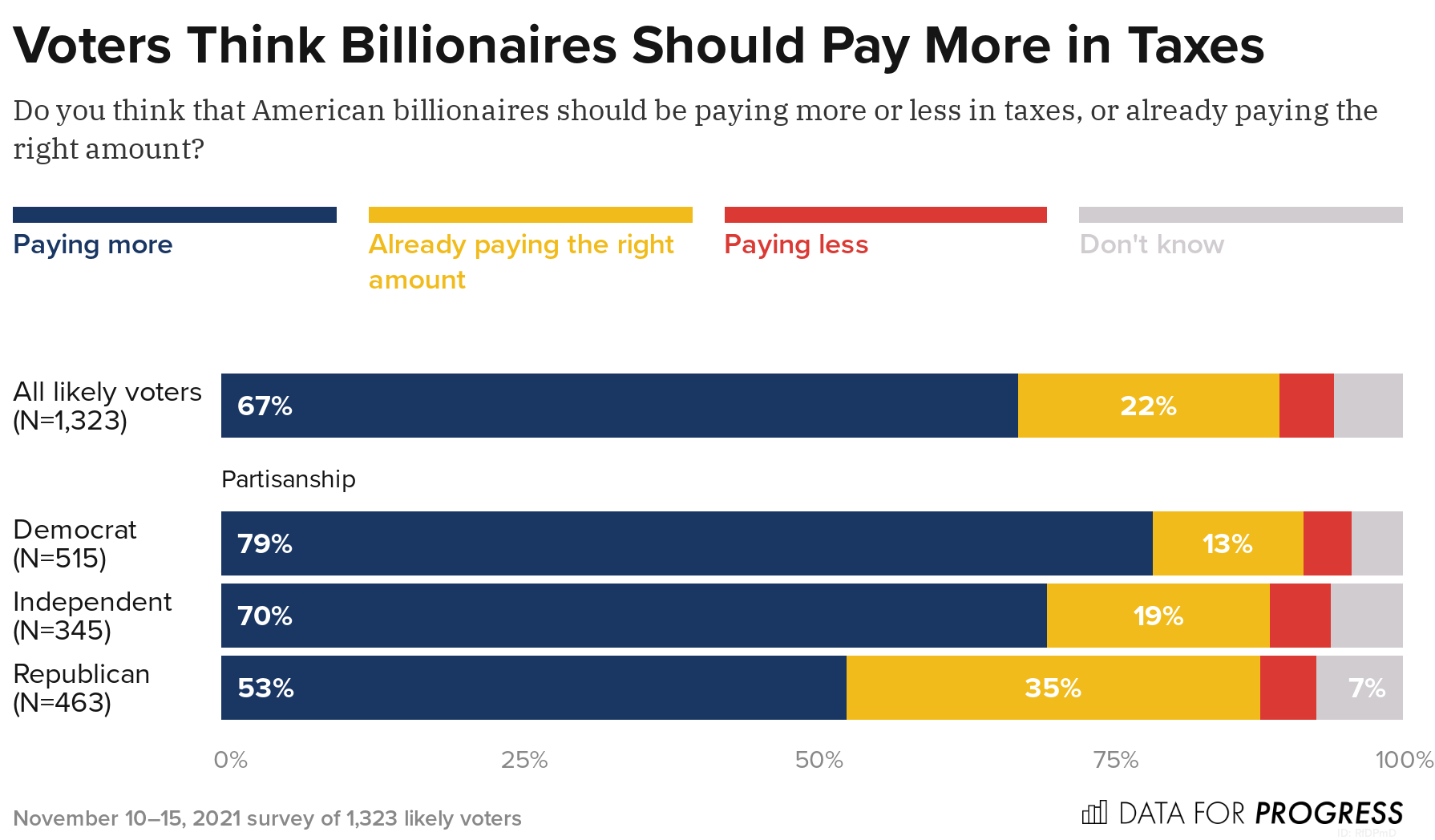Taxing Billionaires is Enormously Popular
By Jason Katz-Brown
Key Findings
67 percent of likely voters, including 53 percent of Republicans, think billionaires should be paying more in taxes.
Taxing billionaires' unrealized capital gains, as in Sen. Wyden’s Billionaires Income Tax, is hugely popular: 64 percent of voters support the outline of the proposal, compared to only 25 percent opposed.
This support is robust: after hearing arguments against the proposal, only 9 percent of supporters are persuaded to oppose the proposal. In contrast, after hearing arguments for the proposal, 24 percent of opponents are persuaded to support it.
A majority of Republican likely voters, 51 percent, support taxing billionaires' unrealized capital gains after hearing arguments for and against.
Introduction
This summer, ProPublica published a bombshell report describing how the richest Americans, including Jeff Bezos, frequently pay $0 in federal income tax, even in years when their wealth expands by billions. They found that America’s 25 richest people incurred a true tax rate of only 3.4% from 2014 to 2018, far less than most American workers. Billionaires from Benioff to Buffet have called for increasing taxes on themselves.
American have taken this to heart. In a November poll, Data for Progress found that 67 percent of likely voters, including 53 percent of Republicans, think American billionaires should pay more in taxes, against only 5 percent who think billionaires should pay less in taxes.
Support for Taxing Billionaires’ Unrealized Capital Gains is Robust
In October, Senate Finance Committee Chair Ron Wyden unveiled an updated version of his Billionaires Income Tax, writing:
Working Americans like nurses and firefighters pay taxes with every paycheck, while billionaires defer paying taxes for decades, if not indefinitely. The tax code’s preferences for capital income over wage income fuel the concentration of dynastic wealth among the nation’s billionaires. The wealthiest few who avoid taxes by indefinitely holding assets are also able to borrow against those assets to fund their lifestyles. This means they opt out of paying taxes and instead pay only low interest rates on loans from Wall Street banks. As a result, middle-class families who earn their incomes from wages and salaries may face higher average tax rates than billionaires.
The Billionaires Income Tax would apply to roughly 700 taxpayers and raise hundreds of billions of dollars, ensuring the wealthiest people in the country pay their fair share toward historic investments in child care, paid leave, and addressing the climate crisis. Only taxpayers with more than $100 million in annual income or more than $1 billion in assets for three consecutive years would be covered by the proposal.
Data for Progress polled this proposal and simulated an environment where debate plays out for and against the tax. First, we asked simply, do you support or oppose a proposal that billionaires pay yearly taxes on their assets, like stocks, that have increased in value? We found 65 percent of likely voters support this proposal, including 50 percent of Republicans. Second, we outlined the Billionaires Income Tax in more detail, and found that support for this proposal remained strong (64 percent overall, 47 percent among Republicans).
Finally, we divided respondents into two groups: for supporters of the tax, we showed arguments against the tax; for opponents of the tax, we showed arguments for the tax. We found that support for the proposal is robust: after hearing arguments against the proposal, only 9 percent of supporters are persuaded to oppose the proposal. In contrast, after hearing arguments for the proposal, 24 percent of opponents, including 22 percent of Republicans, are persuaded to support it.
Merging these results, we find that 61 percent of likely voters, including 51 percent of Republican likely voters, support taxing billionaires' unrealized capital gains after hearing arguments for and against. Only 24 percent of likely voters, and 36 percent of Republicans, oppose taxing billionaires’ unrealized capital gains.
Conclusion
Taxing billionaires' unrealized capital gains, as in Sen. Wyden’s Billionaires Income Tax, is enormously popular. In addition to righting fundamental unfairness in the federal tax code, our polling shows that it is a political winner, with support robust to attacks and debate.
Jason Katz-Brown (@jasonkatzbrown) is CTO of Data for Progress.


